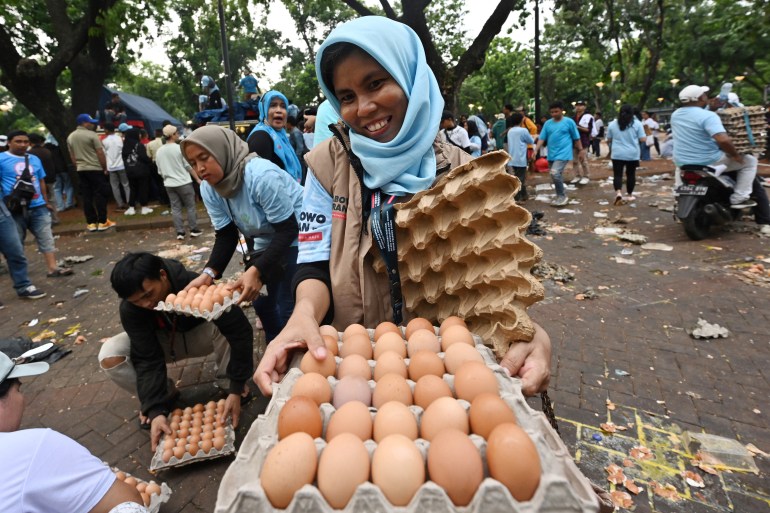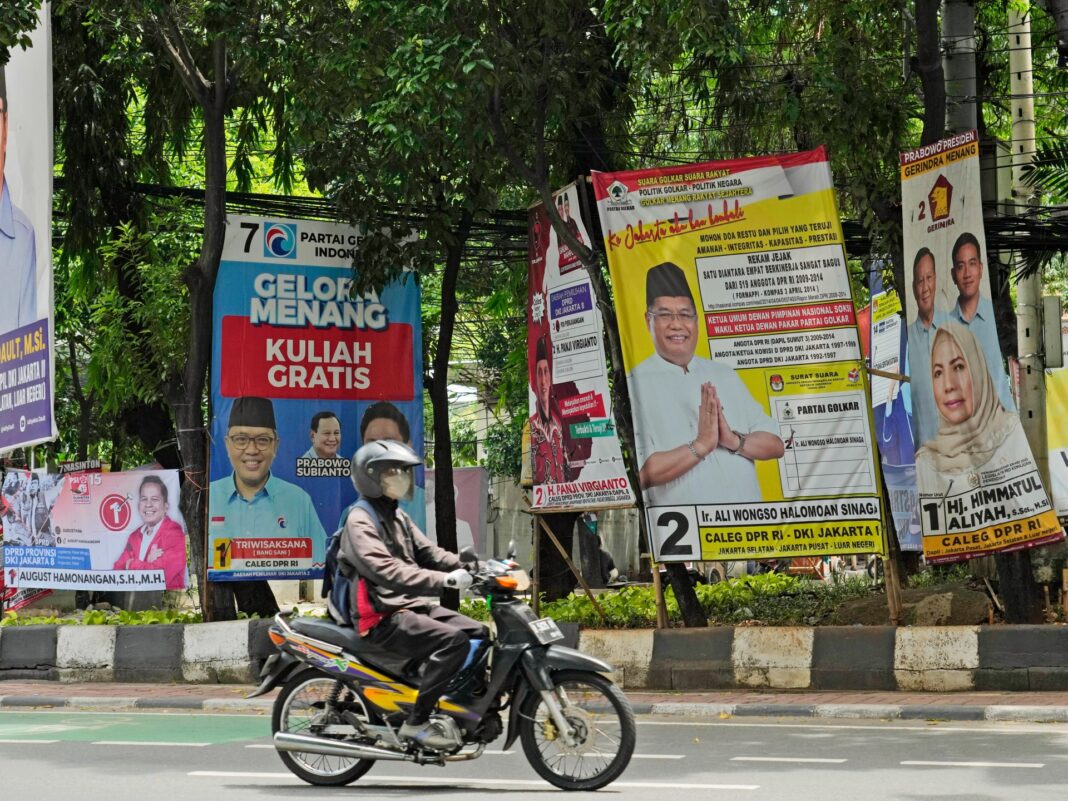Bali, Indonesia – For the last few months, 47-year-old Erfin Dewi Sudanto has been trying to sell his kidney.
One of thousands of candidates running in Indonesia’s regional legislative council elections on February 14, he had hoped to raise $20,000 to help fund his political campaign.
“This is not just a sensation. I am serious. I am minus, no property. The only way [to fund my campaign] is selling my kidney,” Erfin, standing for the National Mandate Party in Banyuwangi in East Java, told Al Jazeera after his social media appeal went viral.
With campaigning continuing for two months, the cost of running in Indonesia’s election is expected to be higher than ever this year. While political parties usually provide some support for logistics and witnesses to oversee the count, candidates must find money for the rest – from stump speeches to campaign T-shirts and memorabilia.
Erfin estimates he needs as much as $50,000 and reveals that much of that will go to providing what he describes as “tips” to secure the support of potential voters.
In other words, vote buying.
Vote buying is illegal under Indonesian law. The penalty is a maximum fine of $3,000 and three years in jail.
But the practice remains pervasive.
“I personally don’t want to buy the vote. [But] it’s rooted in our society. At least [a candidate] prepares 50,000 rupiah to 100,000 rupiah ($3-7) for each voter [to win],” Erfin said.
He says vote buying continues due to the lack of monitoring by officials and that he has been left with no choice but to join in.
“No one is enforcing the law. The General Election Supervisory Agency (BAWASLU) seems to fall on deaf ears,” he said. BASWALU did not respond to Al Jazeera’s request for comment on the allegations.
Burhanuddin Muhtadi, a leading researcher and executive director of Indikator Politik Indonesia, told Al Jazeera that, based on his research, at least a third of Indonesian voters had been offered voting incentives, such as money, or food like rice or cooking oil, either ‘very often’, ‘often’ or ‘rarely’.

During the last two elections in 2014 and 2019, Burhanuddin conducted nationwide surveys on vote buying in relation to the campaign for the national legislature.
In the 2019 election, the number of voters affected in that way would have been equivalent to 63.5 million out of the total 192 million voters.
“For the legislative candidate, the rate is around 20,000-50,000 rupiah (up to $4) per vote,” he said. As a result, some candidates, particularly in densely-populated islands like Java, might have to prepare as much as 10 billion rupiah, or about $683,000, just to buy votes.
The price is even higher in oil and gas-rich regions. One vote in those places can cost $150, according to Burhanuddin.
The figures place Indonesia third in the world in terms of money politics after Uganda and Benin, which is double the average of money politics globally. “It is like a new normal,” Burhanuddin said in his report.
Burhan believes part of the reason for continued vote buying is the change of a proportional representation system from closed to open-list.
Under the closed-list system, which was in place before 2008, the party determined who would get the seats it had won. With open-list, candidates win seats according to the number of votes they get.
“Before the system was applied, there was only limited money in political practice. But after it applies, every candidate competes to win the personal vote. Even between them in the same party,” he said.
‘Win at any cost’
Rian Ernest Tanudjaja, 36, a legislative candidate from the Golkar Party, spent $83,000 on his campaign in 2019.
“I needed the budget mostly for canvassing door to door, volunteers’ incentives, printing calendars and ballot samples,” he said.
Ernest is opposed to vote buying but says the reasons it persists are not related to the voting system. “We cannot only blame the proportional open-list system. Although we change the system, the mentality of the candidates still wants to win at any cost. The vote buying will still be carried out,” he said.
He says eradicating the practice is not only about enforcing the law but also about educating voters.
“People should not vote for a candidate who gives [money] staple food, because this person will only focus on earning the money back through corruption [once he is elected],” he said.
Habiburokhman, the deputy chairman of the Great Indonesia Movement Party (Gerindra), said in December that the cost of campaigning this year could reach as much as $1.5 million in some seats. Most of the money will go towards campaign props and souvenirs to “guard and gather” the voters, he was reported as saying by the Kompas daily, Indonesia’s most respected daily newspaper.
The same month, Indonesia’s anticorruption agency said it was investigating reports from the Indonesian Financial Transaction Reports and Analysis Center (INTRACT) on dubious transactions worth more than $63m allegedly sourced from illegal mining and gambling activities ahead of the 2024 elections.
Last month, it said it was investigating suspicious transactions related to about 100 legislative candidates.
With the high cost of campaigning, some have tried crowdfunding, but it is an uphill battle.
Manik Marganamahendra, a legislative candidate from the Perindo Party in Jakarta, has secured $12,700 through crowdfunding. “I invited my former classmate in campus, high school and colleague in office to an event, where I pitched them my campaign [budget plan] and eventually, they donated,” said the former chief of the student executive board of University Indonesia, who once called the parliament a “Council of Traitors”. He has used the money mostly to print banners.
On the campaign trail, Manik openly discusses money politics. While some voters were aware it was wrong, most still asked for the “tip”.
“For them, elections are only a momentum to earn money,” he said.
Adiguna Daniel Jerash, 23, a parliamentary candidate in Jakarta with the Indonesian Solidarity Party, has been leaning on Instagram, TikTok and other social media platforms to raise funds for his campaign.
“I was inspired by Obama, Bernie Sanders, Alexandria Ocasio Cortez,” he told Al Jazeera. “They are a trendsetter and a proof that crowd-funding can be done.”

However, it has proved a challenge for Jerash. “Indonesia is not yet ready to crowdfund a politician,” he said. After weeks of campaigning on Instagram, he said he had only collected $1,000.
The first-time politician is not giving up and is also using his social media platforms to campaign against vote buying. “I educated my voters about money politics that candidates should not use a tip [to buy votes],” he said. Some of his audience supports his idea. “But Indonesian netizens were mostly annoyed with it,” he said.
In the last week before the election, Erfin had not found a buyer for his kidney. Under Indonesian law, the sale of organs is illegal and punishable by as many as 10 years in prison.
In the scramble for votes, he fears that his lack of cash may have left him at a disadvantage.
“Usually, vote buying begins the last week before the voting day. The candidate will massively distribute the money to gather voters,” he said.







